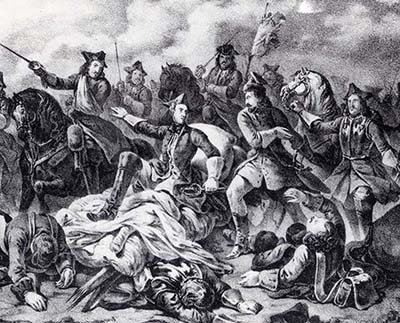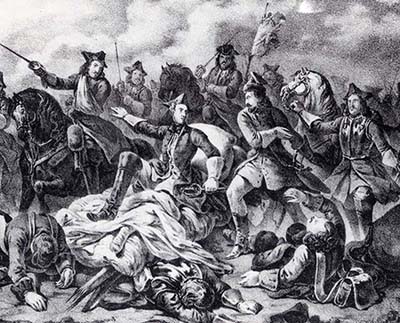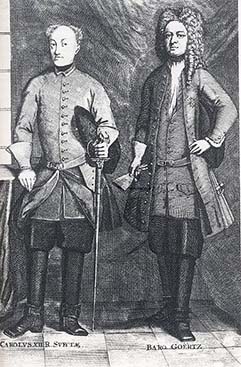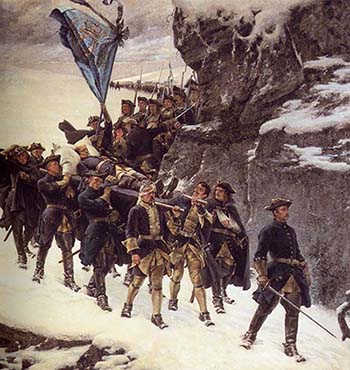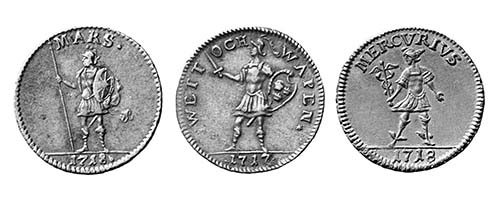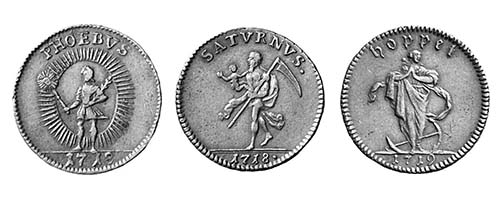The Swedish Emergency Money of Freiherr von Görtz
A lesson on rulers and their scapegoats
Once upon a time, high in the North, there was a fairytale king – or almost, since only the beginning of his story sounds like a fairytale. Fighting all alone against overpowering enemies, Charles XII, the puerile King of Sweden, managed to prevail against the attacks of the powerful at the head of his army; from a defensive position, he even started a war that astonished entire Europe.
The wounded Charles XII is carried to the battlefield of Poltava on a stretcher.
The rest was less fairytale like. Charles XII fought merciless and regardless of any consequences to the bitter end. His war went down in history as the “Great Northern War”. The stubborn king regarded himself attacked unjustly who would only make peace when he could dictate the conditions. At first, he succeeded: Charles defeated the Danes and compelled them to submit to the Peace of Travendal. He beat August II the Strong and drove him from his kingdom Poland. Then he tried to defeat Russia … and failed miserably. At the Poltava, Charles suffered an utter defeat that practically cost him his entire army. He himself managed to flee to Turkey where he immediately began to plan his next campaign against Russia.
First of all, though, he had to leave the Turkish exile and make his way through enemy territory – in the summer of 1714 he made the preparations for his trip. Secretly, the King trained his endurance with long and lonely rides. When his entourage set out to the Swedish territories on September 20th, he rode in front all by himself to overtake any messengers to prevent them from reporting his travel.
Charles rode across Europe, without stopping, without a break. Very few nights he stayed in an inn. To safe time, the King travelled at bedtime in a fast stagecoach where he rested lying on the ground. Thanks to these exertions, the King managed to travel at a then incredible speed and covered 160 kilometres a day on average. It was in the night of November 10th, then, that an exhausted man asked for entrance at the gate of the then Swedish city of Stralsund. At first, the guard was not sure how to react. He called for his superior who, in turn, went for his; officers of higher and higher ranks were called and finally, at four o’clock in the morning, the City Governor announced: his King, Charles XII of Sweden, had just, after 15 years of absence, stepped on native soil again.
It is not that the King granted his bled country peace. Quite the contrary, he instantly thought about how to finance his next campaign. This is where the man comes in the Swedish people later pegged as scapegoat for Charles’ merciless exploitation of his own population.
Freiherr von Görtz and Charles XII.
His name was Freiherr Georg Heinrich von Görtz; he came from a noble Frankish family and had studied at the University of Jena. He wanted to spread his wings and so he went north to look for a master – which he found in young Fredrick IV, Duke of Holstein-Gottorp. After Frederick’s early death Görtz continued to stay at the court and pulled the strings for the new, only two-year-old duke. That brought him in contact with Charles XII whose heir little Charles Frederick of Holstein-Gottorp was as long as the king did not marry and begot sons of his own – which, by the way, he never got round to. Görtz had visited the ruler in Stralsund to safeguard his charge’s interests; Charles, on his part, thought the young diplomat such useful that he entrusted him with the administration of his entire kingdom.
The primary task of Charles’ new minister was to squeeze out new resources from the utterly depleted country in order to finance the next campaign. Görtz complied with his king’s orders: he raised taxes, had paper money printed, issued the famous Görtz’sche Nottaler and therewith financed the king’s next military expedition. The noble men, the burgesses, the ordinary man on the street, they all hated him for what he was doing. It made no difference whatsoever that Görtz urged the king again and again to make peace to finally let his country recover. Görtz even initiated negotiations and tried – without the king knowing – to reach an agreement with Russia.
The corpse of Charles XII is returned home.
In the middle of these negotiations Freiherr von Görtz was arrested. Charles had died, fallen in battle. The Swedish King had known that his country would not have the means to levy another army and had personally gone to great lengths to make his campaign a success. In the end, it was too high a risk and Charles was shot by an anonymous sniper in front of the Norwegian fortress Frederikshald.
Görtzsche Nottaler – most of the reverses depict Greek deities. Equally important is the personification of Hope. For a catalogue of these pieces cf. MR 3 (2007).
Some sources quantify the total number of circulating Nottaler as 20, others as 40 million. After the death of Charles they continued to be used at first – the war against Russia was by no means over. Only after the Peace of 1721 the Nottaler was reduced to half of their nominal value and later completely devalued.
That was the death warrant for the loyal minister, too. It was simply impossible for the descendants of the Swedish king to explain to the people that they were not able to pay the debts Charles had incurred with the issue of paper money and emergency money.
Hence, a scapegoat was needed as the person responsible for the mismanagement of the big war hero. Görtz was taken in custody. Everything was taken away from him. He was given neither knife nor fork since the officials were afraid that he might take his own life.
After six weeks, Ulrika Eleonore of Sweden and her husband, Frederick I of Hesse-Kassel, were satisfied with the preparations made for the show trial. They had needed this long period of preparation to solve a problem: Freiherr von Görtz had executed his office with absolute sincerity – something extraordinary in those days. He never did anything to his advantage, never enriched himself by a single coin. What could this man be accused of?
For Görtz, they came up with a new crime. It was said that Freiherr Georg Heinrich von Görtz had alienated the people’s affection from the king. The exact wording of the charges was of no relevance since the trial was a stitch-up, with the death warrant signed right from its beginning. Görtz did not face a regular court, specifically for his trial an extrajudicial commission was assembled together. Görtz was granted no legal assistance, he was not allowed to name any witnesses in his favour, and he was not even allowed to bring any written notes to the court room in order to defend himself.
It came as no surprise, then, that the accused was sentenced to death by decapitation. What Görtz made protest was the fact that his body – as an increase of penalty – was not to be buried according to Christian customs but hid in the ground below the place of execution just like a felon’s. He appealed to the Queen who insisted on the correct enforcement of the verdict. It is said that Görtz boldly ascended the scaffold. His last words have survived: „You bloodthirsty Swedes, take the head then that you craved for so long.” The minister’s grave is forgotten. His Royal Master, in turn, admired and loved by his people, lies in the Riddarholm Church in Stockholm, in a black sarcophagus covered by a bronze lion skin. His descendants have achieved their goal: up to the present day, the Swedish emergency money of 1715 to 1719 is associated not with Charles XII as its commissioner but with his minister, Freiherr von Görtz.







